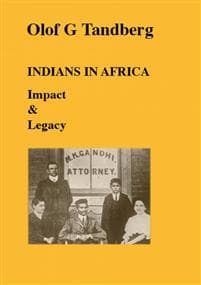
Indians in Africa : impact & legacy : the Indian diaspora in Africa 1500 BC - 2010 AC
270 kr
270 kr
På lager
On., 30 april - on., 7 mai
Sikker betaling
14 dagers åpent kjøp
Selges og leveres av
Adlibris
Produktbeskrivelse
During the 10th century BC Indian and Arab traders bartered along the shores of Anzia and Zanj (East Africa) where small, fortified Arab harbours provided traders protection. Today, the trading centres are no more, however archaeologists have found Chinese porcelain from the Ming Dynasty, amber, crystal, precious stones and Indian pierced pearls. In 1832, the Sultan of Oman moved his capital to the island of Zanzibar, which became the bridgehead for the economic development of East Africa. Two Muslim business tycoons met in Zanzibar – A M Jevanjee and Alladina Vishram – and planned how to develop East Africa’s Muslim Economy. In 1896, the first lot of 30,000 Indian indentured labours were shipped to Durban in order to open up the sugar plantations in Natal. In 1893, a young Indian barrister, M.K.Gandhi, came to Durban. He convinced his countrymen to fight for their human rights. Gandhi became a charismatic initiator of the concept Satyagraha (non-violence) – as active resistance. The Indians in Uganda successfully refined cotton and sugar. In 1962, the self-declared “general” Idi Amin accused the 75,000 Uganda-Indians for Economic Sabotage and gave them 90 days to pack their bags and go. The Kenya railroad from Mombasa to Lake Victoria was built by Indian workers to the sacrifice of 1,164 deaths and 3,424 invalids. The Indian shop, the Duka Wallah, transformed African bartering into the European cash economy and became a cornerstone in the Colonial economy. A visitor from the early part of the 20th century noted: “The Indians’ most marked feature is their stubborn energy. Unlike the British, the Indians take no tea breaks or waste time on sports; they do not close their shops over the weekend; they work like smiling beavers; most particularly, unlike the British, they do business with the African natives. On the contrary, they welcome everyone with open arms – without the least consideration to skin colour – everyone with money to spend…” In their Independence speeches three African Statesmen gave the Indians special attention: Jomo Kenyatta of Kenya referred to the legal support given to him by Indian lawyers at the Kapenguira trial. Julius Nyerere promised the Indians in Tanzania peaceful transition and equal representation. Nelson Mandela thanked the Indians for their fight against apartheid and esteemed their determination to reach liberty without violence. This book gives tribute to the 1.7 million Indians born and raised in Africa. They deserve to be recognised for their impact and legacy. Acknowledgements: Special thanks to the word curator Niki Woods for her patience and great engagement – and to photographer Georg Kristiansen for his enthusiasm and creative support with illustrations and lay-out. Thanks also to Mr Afzal Chaudhri for his long-lasting support and to Mr Harjinder Kanwal for opening his rich archive “Nostalgic East Africa.”
Artikkel nr.
7eca8fa5-2d24-4bc8-af06-0123315cfac4
Indians in Africa : impact & legacy : the Indian diaspora in Africa 1500 BC - 2010 AC
270 kr
270 kr
På lager
On., 30 april - on., 7 mai
Sikker betaling
14 dagers åpent kjøp
Selges og leveres av
Adlibris
Lignende toppselgere

4-Pak - Tesla Senterkopper - Bil Svart/silver
129 kr
4,5
mandag, 5 mai

Anti-snork Bånd / Magnetiske Plaster - Stopper snorking
149 kr
mandag, 19 mai

Øreputer for Bose QuietComfort - QC35/QC25/QC15/AE2 Hodetelefoner Svart
99 kr
4,5
mandag, 5 mai

Luftrenseenhet - Renser / Saniterer luften - 20,000 mg/h
599 kr
4,3
mandag, 5 mai

Universallader for Garmin klokker Svart
89 kr
4,2
fredag, 2 mai

4-Pak - Volkswagen VW Senterkopper - Bil 65 mm
129 kr
4,1
mandag, 5 mai

RCA til HDMI Converter 1080p - Adapter
139 kr
4,5
mandag, 5 mai

Hundetrimmer / Potetrimmer - Trimmer for Poter
199 kr
4,3
mandag, 5 mai

Vileda
Rengøringsklud, Vileda PVAmicro, 38x35cm, blå
299 kr
onsdag, 30 april

-2 %
Trådløs CarPlay-adapter 2025
449 kr
Tidligere laveste pris:
459 kr
3,8
mandag, 5 mai
Anbefalinger til dig

INF Filter for MSPA oppblåsbare bassenger FD2089 4-pakning
299 kr
4,8
onsdag, 30 april

INF Hjulmutterhette med fjerningsverktøy, 20-pak 21 mm
95 kr
4,6
fredag, 2 mai

Plenlufter - Piggsko for å lufte plenen
269 kr
4,0
mandag, 5 mai

INF Etterfilter til Dyson V11 / V15 akselstøvsuger 3-pakning
229 kr
3,9
onsdag, 30 april

SERO Apple Macbook magsafe 2 lader, 45 W - for Macbook Air
399 kr
3,7
tirsdag, 29 april

-7 %
INF TYPE-C Dual SD/TF-kortleser for rask dataoverføring 0
99 kr
Tidligere laveste pris:
107 kr
3,3
fredag, 2 mai

3-Pak - Fidget Spinners med Sugekopp for Barn
179 kr
4,4
mandag, 5 mai

Sony
Sony | Playstation® 5 Slim (Digital-versjon) - Spillekonsoll - 1TB SSD NVme - Wi-Fi/LAN - Hvid
5 852 kr
4,6
mandag, 28 april

Sero
SERO Apple Macbook magsafe 2 lader, 60W - for Macbook Pro 13" m. Retina skjerm
349 kr
4,2
tirsdag, 29 april

Limited edition3 for 649 kr
SIGNS STEELBOOK
379 kr
5,0
fredag, 2 mai